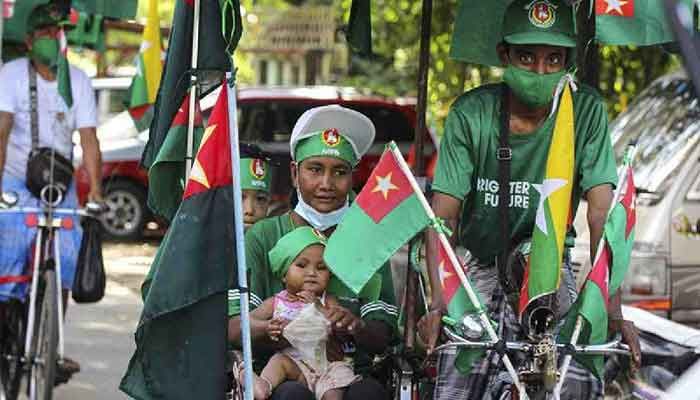
Desk Report
Publish: 06 Nov 2020, 04:45 pm

Photo: Collected
Myanmar's citizens go to the polls on Sunday in an attempt to preserve the fragile democracy that they helped set up just five years ago.
Approximately 37 million eligible voters are registered, although participation is expected to suffer as a result of a recent rise in coronavirus cases, reports AP.
In 2015, the enthusiasm was strong about the chance to bring an end to more than five decades of military rule. Nobel Peace Prize laureate Aung San Suu Kyi, the National League of Democracy, roared to a landslide election victory and became her country's leader after several years of hard work at the forefront of the non-violent movement against military dictatorships that earned international admiration.
Her party is expected to return to the polls this year, but some critics believe that her administration has struggled to embrace democratic values.
Chances for real reform have always been elusive, as the 2008 constitution drafted under the military guarantees that it has enough seats in parliament to prevent amendments to the charter. Key ministries are also under the jurisdiction of the military.
Critics accuse 75-year-old Suu Kyi and her party of being more concerned about entrenching itself in power than encouraging a broad-based democracy.
“This time, neither Aung San Suu Kyi nor her party is bringing democracy to Myanmar. Instead, they are trying to bring in a one-party democracy system,” charged Khin Zaw Win, director of the Tampadipa Institute, a Yangon-based policy advocacy group.
Feeling other parties meant that there was no real policy discussion during the campaign. Myanmar needs a better policy mix, he said.
Even the voting process has been embroiled in controversy, as the state election commission has been accused of conniving with the ruling party of Suu Kyi by canceling the vote in some areas where government-critical parties were certain to win seats.
The Union Election Commission insisted that the vote was canceled due to armed conflict with ethnic guerrillas in those regions.
The decision was one of several points that Thomas Andrews, the U.N., questioned last week. Independent rapporteur on human rights in Myanmar.
Buddhist-majority Myanmar, he said, would not be able to hold free and fair elections “as long as ... the right to vote is denied based on race, ethnicity, or religion, as it is with the Rohingya.”
Long-standing discrimination against the Muslim Rohingya minority, which many consider to have immigrated illegally from South Asia even though their families have been living in Myanmar for decades, has deprived most of them of citizenship rights.
Western friends of Myanmar were shocked by the brutal 2017 counter-insurgency operation by Myanmar's army, which led some 740,000 Rohingya to flee to neighboring Bangladesh on charges of genocide.
It also sent the reputation of Suu Kyi and Western admirers into a tailspin when she refused to restrain the security forces. But for most people in Myanmar, Rohingya is not an election issue.
Andrews also argued that opposition political parties complain that they are refused access to state media and that their communications have been blocked for opposing government policies.
Measures to control the coronavirus severely restricted traditional large-scale campaigning by all parties, but Suu Kyi benefits from frequent reports in state media about her carrying out her official duties, and from her regular updates about fighting the coronavirus streamed on her Facebook page.
Her administration had already been criticized by free speech advocates. It scrapped some censorship and licensing laws but aggressively employs defamation and telecommunications laws against journalists and activists critical of the government and the military.
Failure of much-touted plans to reconcile with the country’s fractious ethnic minorities is another dent in Suu Kyi’s reputation. Ethnic minority groups, mainly in border areas, have for decades been engaged in on-again, off-again armed struggle for autonomy.
Ethnic political parties signed tactical agreements with the NLD in 2015 to ensure victory over the military-backed Union Unity and Development Group, the key challenger to Suu Kyi's faction.
This year, frustrated by the inability of Suu Kyi to seal an agreement to extend their political rights, only their own candidates will be moved forward.
Nevertheless, Suu Kyi remains the country’s most popular political figure by far.
“I think it is really the personal support, even love, that many people have for Aung San Suu Kyi herself, almost irrespective of how the government administration performs, how the economy performs and so on,” Yangon-based political analyst Richard Horsey said of her appeal.
Subscribe Shampratik Deshkal Youtube Channel
© 2024 Shampratik Deshkal All Rights Reserved. Design & Developed By Root Soft Bangladesh